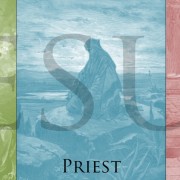Do you preach a three-fold Mediator?
Sometimes when God grips my heart in a certain area or when I have grown in my understanding of some aspect of biblical understanding/interpretation, I can allow that to dominate my teaching. While it is unavoidable (and even to some degree vital for the things I am personally learning) for things to come through my teaching, we should allow the text itself to shape our message. If our emphasis is always in one direction, then other areas become deficient. One of the areas we can do this is in our proclamation and understanding of God’s Mediator, Jesus, as Prophet, Priest and King.
As Prophet, salvation is proclaimed. One of the ways that Jesus is mediator is that he comes and proclaims to us the way of salvation. In John 1:18, Jesus tells us that he has made the Father known to us. (made known in Greek is exegeomai, where we get the word exegesis). In other words, one of the offices of Mediator is declaring the way of salvation. If Jesus is not the prophet (as Deut 18:15-22 describes), then the way of salvation is left to us to discover. We must find an invisible God (Col 1:15). Without Jesus’ mediatorial role of Prophet then who’s to say that there is only one way to God. It’s up to us to find it ourselves, which in that respect means we mediate ourselves. Sadly this is the only natural route for sinners because it is self-blinding and self-exalting. God must penetrate our self-exalting world with a prophetic message, turning on a light in darkness, causing faith at the hearing of God’s prophetic message (Rom 10:5-17).
As Priest, salvation is obtained. Jesus’ priestly role is critical to mediation. Someone had to stand in the gap to effect reconciliation. Of course that reconciliation is uni-directional. It is us who have to be reconciled to God. God has not sinned against us, we have sinned against him. This makes us objects of God’s wrath (Rom 1:18; Rom 2:5). Our sin against a holy God is heinous. Without Christ as our preist, we must become our own priests. No earthly priesthood is sufficient for such reconciling work, because then the reconciler needs himself to be reconciled just as the high priest would have to offer up sacrifices for himself (Lev 16:6; Heb 5:1-3). The true Priest, must hold a forever priesthood (Heb 5:6). One of the things that makes this so unique, is that the true High Priest, not only offered a sacrifice, but was himself the sacrifice. Yet he was raised from the dead meaning his priesthood isn’t for a term, but eternal. This means he is always in the position of bringing us to God. God’s wrath is appeased by his sacrifice. We have true hope because our priest represents our new selves before his Father.
As King, salvation is applied. The King has power to rule his subjects. The world is subject to him. We are not monarchs of our own little kingdoms. We are taken captive by the devil to do his will (2Tim 2:26). We need a King with power to deliver us from the guerilla domain of darkness (Col 1:13), having been conquered by the benevolent King of kings (2Cor 2:14). It is the king who has the might and right to set captives of sin free and to establish legitimate rule. He also has every right to wield the sword of justice (Rom 13:3-6). We respond then in love to the King.
If he were to simply rule us without a priestly work, we would be judged in our sin. We would never know such a king without his prophetic work. Only as Prophet, Priest, and King is Jesus all sufficient. Sin is entirely dealt with. Righteousness is fully applied. The invisible God is clearly seen by faith through prophetic revelation. We serve a great Mediator. He declares the way as Prophet, prepares the way as Priest, and preserves the way as King.

